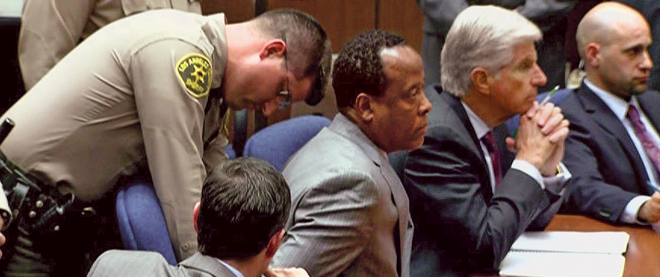‘We should have had you do O.J.!’
The prosecution gets the kudos as Dr. Conrad Murray is convicted in the death of pop deity Michael Jackson
Rex Features/CP
Share

The prosecution’s performance in the trial of Dr. Conrad Murray, personal physician to pop deity Michael Jackson, was summed up by one of the Jackson worshippers gathered outside the courtroom to see justice done: “We should have had you guys do the O.J. trial!” he shouted. It was an apt observation. Murray’s trial, though fraught with scientific issues, was almost as free of distracting nonsense as the Simpson process was full of it. Praise for the efficiency of Deputy District Attorney David Walgren and his team flooded in Nov. 7, even as Murray, found guilty of involuntary homicide for injecting Jackson with a lethal dose of the anaesthetic propofol, was led away in handcuffs to spend a first night in prison under a suicide watch.
When Jackson died on June 25, 2009, the 58-year-old Grenada-born cardiologist became the last in a long line of doctors inveigled into serving the whims of a charismatic zombie. Murray, hired by Jackson in 2006, made an attractive scapegoat for family members and delusional fans, none of whom wanted to acknowledge the desperate psychological condition and drug-seeking behaviour of the emaciated King of Pop. The death scene at Jackson’s home, full of bottles of prescription medications with pseudonyms or blank spaces where a doctor’s name should have appeared, told the real story.
“I’m finding out all of these things and it’s piece by piece,” Murray whimpered when the police read him the litany of drugs. “I gave Mr. Jackson love. I was his friend. I cared about him. I tried to help him.”
Unfortunately for Murray, he made the decision to give Michael Jackson propofol as well as love. First introduced in a practical form in 1986, the anaesthetic that killed Jackson swept precursors out of the market quickly. It provides a faster and much more serene recovery than sodium pentothal, which often induces a “hangover.” But the margin between an effective dose of propofol and a hazardous one is narrow.
Murray administered the drug intravenously after trying to put an agitated Jackson to sleep with benzodiazepines, which can interact with propofol to suppress a patient’s breathing. The doctor told police he had recently begun to suspect that Jackson was dependent on propofol, which the singer called “milk,” but he succumbed to Jackson’s pleas for it when nothing else worked. That decision horrified anaesthesia professionals. Selma Calmes, a leading anesthesiologist, advised the coroner on Jackson’s case that it was unknown for propofol to be used for insomnia relief. The only recorded instances of in-home use, she added, left corpses behind.
Murray’s defence team aired a theory that the singer had self-injected with extra propofol while the doctor was out of the room, but Dr. Paul White, the lone expert who was willing to entertain the possibility, met with heavy contradiction. White was allowed to testify because he laid much of the research groundwork for the popularization of propofol. But he became confused on the witness stand, alluding frequently to supposed facts not in evidence that he had gleaned from discussions with Murray and the police. Judge Michael Pastor eventually became angry enough to order a Nov. 16 contempt-of-court hearing for White.
In the end, the prosecution argued that the self-administration theory was both improbable and irrelevant. Even if Jackson could have remained conscious long enough to push a full dose into his IV, Walgren contended in his closing statement, Murray was still criminally culpable for leaving Jackson unattended in a non-clinical setting and ignoring the foreseeable consequences. Even White testified that he would never administer propofol in a bedroom, or leave a drug-seeking patient alone with a dose of it.
The jury reached a guilty verdict after two days of deliberation, but the crowded California penal system is not likely to have room to host the disgraced Murray for more than a few weeks. The judge temporarily suspended Murray’s licence to practise medicine in California, but the state’s medical board will conduct its own investigation before deciding whether to end his career there. All in all, Murray will receive about the same punishment he would have gotten for assisting in a suicide. That seems appropriate, given that the unlucky, weak-willed physician was alone in the dock to take the brunt of a slow-motion tragedy, decades in the making, that involved dozens of other enablers.